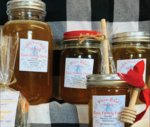Farming in the same area and living in her childhood home, Ashley Cook of Wartrace naturally wants to pass on the same hard work ethic she acquired as a girl.
Even in these days …
This item is available in full to subscribers.
To continue reading, you will need to either log in to your subscriber account, or purchase a new subscription.
If you are a current print subscriber, you can set up a free website account and connect your subscription to it by clicking here.
If you are a digital subscriber with an active, online-only subscription then you already have an account here. Just reset your password if you've not yet logged in to your account on this new site.
Otherwise, click here to view your options for subscribing.
Please log in to continue |


Farming in the same area and living in her childhood home, Ashley Cook of Wartrace naturally wants to pass on the same hard work ethic she acquired as a girl.
Even in these days of economic uncertainty, Cook Family Farm, located at 310 Potts Road in Wartrace, remains a local agriculture cooperative.
In an effort to remain diverse, the farm generally consists of bee hives as well as goat herds, cows and other animals—some often a part of her kids’ latest FFA or 4-H projects.
“It’s still very satisfying,” says this busy Bedford County farmer, wife and mom.
The Cook family Husband, David, affectionately known in Wartrace as “Butter Bean,” has worked for many years at Cooper Steel. So Ashley’s pretty much on her own when it comes to working the bees.
A shley’s children, when they’re not busy with school or band, help on the Cook Family Farm. The barn office is full of awards and ribbons they’ve received throughout the years through FFA and 4-H.
Kimber is a Cascade senior, with plans to attend the University of Tennessee-Martin in the fall. She currently aspires to major in animal science and health. Kimber was busy in the Central Region Beef Show this summer, where she placed first in the senior level 2 skill-a-thon. She and her cows, known affectionately as Ophie and Amelia, were headed to the state show.
Son, Robert, age 13, works in the chicken barns with Ashley’s dad, Bobby Potts. She says it seems that Robert is starting to also latch onto farm life, which makes her smile.
But she won’t push her children into farming, she says, or into being the next generation to maintain the Cook Family Farm. That will be their choice, but by all indications, they may be headed toward that path, she says.
While she understands farming is not a lifestyle chosen by everyone, Ashley says the country still needs farmers. Her family is a good example that the fruits of farm labor can be sweet. “It’s what I do.”
Creating a legacy
While the family doesn’t consume their own goat meat, they find there’s still a great market for their herds. So they spend a lot of time nurturing, and protecting, their animals to their fullest potential.
In this eastern portion of Bedford County, there are several predators, such as coyotes. Protecting the herds and maintaining their physical needs is a constant, Ashley reveals.
The family also raises Anatolian Shepards-some which are mixed with Great Pyrenees. The puppies will either become someone’s pet or perhaps Ashley’s next generation of herd protectors. The dogs are quite attentive, especially to strangers.
While her neighbors and family, the Potts, have made a name in Bedford County for meat processing, the Cook family prides itself on other aspects of agriculture, like honey production.
Still, a honey harvest can even be unpredictable at best. Many things, like cooler weather, can hinder production.
Ashley currently has jars of honey and orders can be placed through the Cook Family Farm Facebook page. There’s a honey system box set up at the farm.
Beekeeping is a year-round task and a family tradition. Ashley says the honey idea actually started with her late aunt; she inherited her processing equipment.
Ashley recently became a certified master beekeeper. She’s learned even more, now, about the honey-making process.
How it all began
It was at the outset of the pandemic, this Bedford County farmer explains, when she “fell in love” with bees. These days, it’s not unusual to see her climbing a ladder somewhere to retrieve a swarm.
The greatest importance of honey bees to agriculture isn’t a product of the hive at all. It’s their work as crop pollinators.
This agricultural benefit of honey bees is estimated to be between 10 and 20 times the total value of honey and beeswax, according to the FDA. In fact, bee pollination accounts for about $15 billion in added crop value.
This Bedford County farmer says, while pushing back her billed cap, it should be made clear that beekeeping isn’t for everyone.
Ashley often keeps her Facebook friends up-to-date on bee activity. She posted on Facebook in late spring, “It’s been a hot morning in the bee yard. I checked on my two new purchased queens, both laying eggs. A couple of weeks ago, David surprised me with a tiny mating nuc and stuff to start grafting queens myself. I used the mating box for a queen cell I removed from a colony and she’s hatched out and been laying for a few days.”
As tough as the nails, she passes off any bee stings which might happen in the process. When the honey is ready, she lets her community know.
“Come out to the farm and grab some honey,” she says. “No appointment needed.”
Now, that’s rural life in Bedford County, at its best.